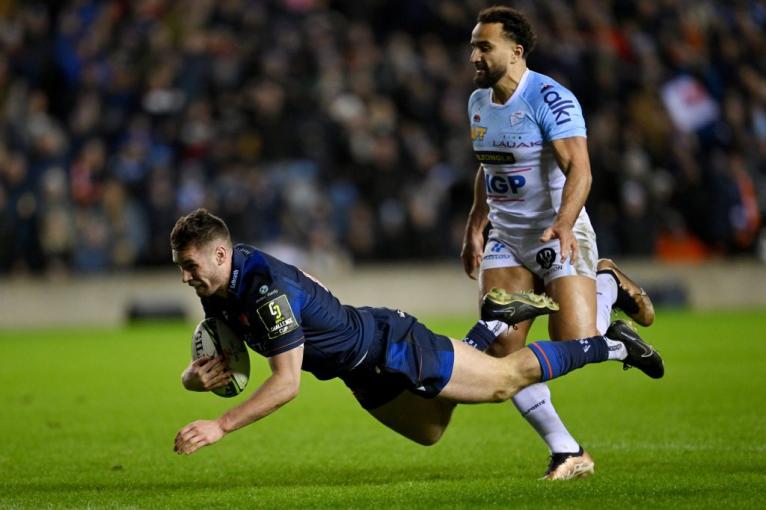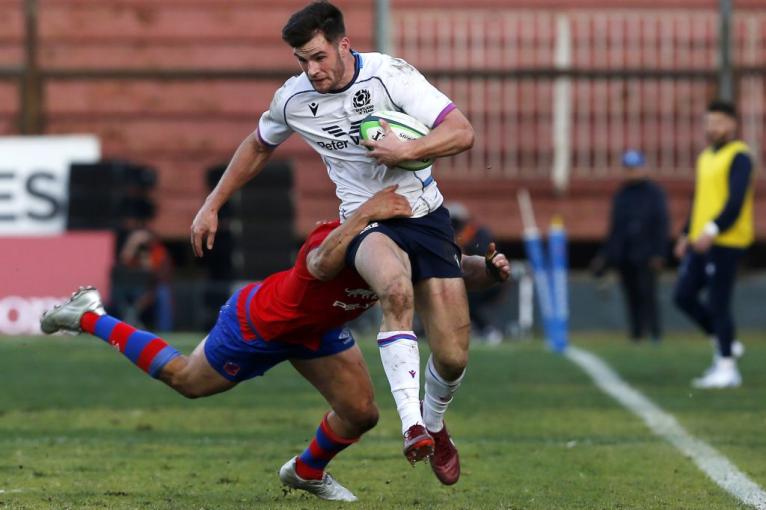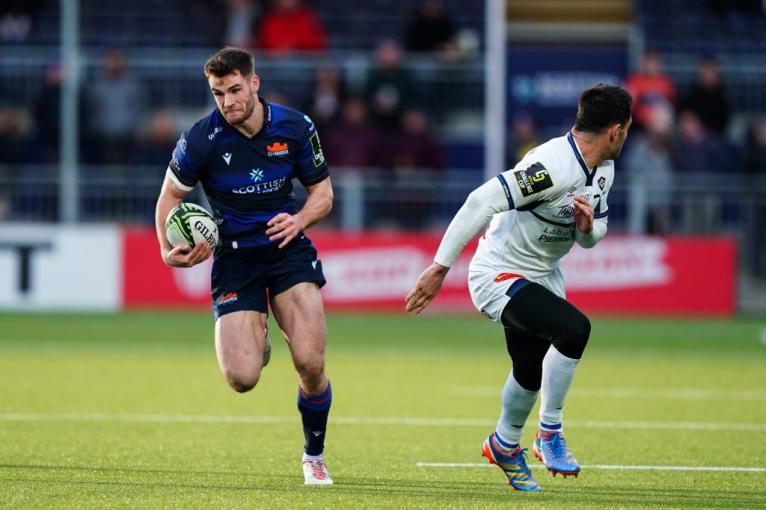Edinburgh are back in Durban again. Same city, same hotel, same rooms for some of the players. Matt Currie is bunking exactly where he was two weeks ago, when the Scots fetched up at Kings Park with URC business to settle and were vanquished 23-13 by John Plumtree’s spluttering team of Springboks.
A Challenge Cup semi-final is the prize this time, exalted air Edinburgh have not breathed in close to a decade. The vexatious issue of scheduling tournaments which straddle two hemispheres has seen them sent to South Africa once more. Franchises are racking up air miles quicker than travelling salesmen. The Bulls, notoriously, have spent close to £200,000 to book the eight flights required to get their team from Pretoria to Northampton and back again for the Champions Cup quarters.
For a young centre in the spring of his career, this stuff is still like catnip. Currie is 23, a burgeoning talent long earmarked for Test honours, and commanding regular first-team minutes in the Edinburgh midfield.

“It’s still pretty cool, the novelty of coming to South Africa to play hasn’t worn off yet,” he says. “The stadium is one of the best places I’ve played. They’ve still got the little swimming pool at the end.
“I don’t mind the travel; you’re spending all your time with your mates. Normally you come out early enough in the week you can get through it all. We flew overnight on Tuesday, got off the flight early Wednesday morning, had downtime for boys to sleep if they wanted to, then got into mobility. If the travel has any physical impact, there’s plenty of time for us to overcome it.
“Some of the boys will be up in business, some are in economy – I’m in economy. I’d say it’s done on height initially, so all the big lads get business which is fair enough because they need the leg room.”
Edinburgh fired few shots last time they were in town. A late Boan Venter try burnished an otherwise ugly scoreline. Edinburgh had 44% possession and 36% territory. They allowed the Sharks sixteen entries into their 22 for only five in response, and shipped a dozen penalties.
Sean has been really good at bringing in game management and we’ve had a fairly strong focus on that.
Why might things be different this time? The personnel will be almost identical. Edinburgh know plenty about their expensively-assembled and world champion-laden hosts. Coach Sean Everitt is a Sharks man from the wisps of brown hair sprouting from his scalp to the soles of his rugby boots. He played for the union’s B team and held almost every position at the franchise until his sacking from the top job two years ago.
Everitt has laced Edinburgh’s attacking blueprint with pragmatism. No URC side kicked less ball from hand last season and few conceded as many turnovers or leaked tries so cheaply. Edinburgh are a tighter unit as a result, but it feels like the increase in prudence has blunted their cutting edge.
“Sean has been really good at bringing in game management and we’ve had a fairly strong focus on that,” Currie says. “He enjoys his stats and he shows us how important it is how and when we kick. We’re still developing that but we’re getting a good grasp of it, and our game leaders are bloody good at it. Hopefully off the back of that you get loose ball, turnover ball, and that’s when we can bring our very dangerous back-three into it.
“I don’t think our ambition or flair have gone; it’s just not clicked perfectly at times this season. But you’ve seen when it has, how dangerous we are. It’s just making sure we are building an all-round game. Game management is a big part of it. Attack is something we do have and we can’t move away from too much. Our back-three is world-class so it’s definitely something we need to make sure we’re using. Hopefully towards the end of the season you’ll start to see our attack flow better than it has.”

There were clunky moments in the last-16 victory over a Bayonne side which revels in chaos. The Basque crusaders toss offloads and spam the gamble button gleefully and their panache loosened Edinburgh’s grip on the contest more than once.
But there were also flashes of exceptional class. Currie provided the most striking, his dispatching of a soft tackle teeing up a 50m gallop to the whitewash beyond three chasers.
“I don’t know where that came from, I found a bit of open space and legged it,” he laughs. “Bayonne played a fairly loose game which worked in their favour quite a few times. But the stats show we had a fair amount of territory and in the first half the scoreboard didn’t reflect the possession we had.
“That’s maybe where it looked like we weren’t in control, there was a bit of frustration with how clinical we were being to finish what we created. But we did well to stay in control and we talked about remaining calm, how we’ve got them, we just need to keep this up for 80 minutes and it showed in the second half. The scoreboard started ticking over slowly and we stuck to what was working well for us.”
Currie’s road to the pro game began on a dairy farm in Dumfries. The middle child of three brothers, he was enlisted as a rugby player almost as soon as he could walk by Jack, the eldest boy. Tom, the baby of the brood, is a current Under-20 international and part of Edinburgh’s academy. He and Matt share an apartment in the Scottish capital.
The earlier you can get young boys in, training and experiencing that kind of level, that’s when I did most of my learning.
“The farm was really good for us growing up,” Currie says. “There is so much you can do, so much space. During covid I spent lockdown at home and we got put to work.
“It’s good for you at a young age to experience that kind of thing. There are definitely some skills you can pick up, and it gives you a bit of a work ethic. My older brother manages the farm with my dad so he’s always been fairly invested in that, and went away to study agriculture.
“There is a strong farming community in Dumfries which ties to the rugby club, Dumfries Saints, where I started playing. You could maybe link some kind of work ethic to them and how they transfer that onto the rugby field.”
Scotland’s player pathway has been much-maligned these past few years. Despite obvious nuggets emerging from the production line, the U20s team are ill-equipped to compete with the heavyweights of the Six Nations scene. Scottish rugby has been ruminating, studying and at times feuding over the best domestic system practically since the dawn of professionalism. There is unanimous acknowledgement the current setup is not delivering players quickly enough or in the requisite numbers. As a result, the semi-pro SuperSeries will be scrapped this year and it is unclear what will replace it.
“I didn’t have any bad experiences coming through the academy and the U20s,” Currie reflects. “The best thing coming through was the exposure you get to the pro environment. The earlier you can get young boys in, training and experiencing that kind of level, that’s when I did most of my learning. After school, on the knowledge and physical side of things I was not where I could have been. As soon as I came in with Edinburgh you were pushed in those areas and find yourself improving quickly.
“And you need game time as a young lad. When I first came out of school the SuperSeries had just started and I had a couple of opportunities there before injury. What I did get out of that was really good. Any kind of time on-pitch you get playing consistently is when you can make progress.”
A beefed-up Premiership, the top tier of the amateur game, appeals to Currie. So do A fixtures for players on the periphery of the Edinburgh and Glasgow squads, an important tool for building physicality, sharpness and cohesion. At present, too many good players and playing too little rugby.

“There’s chat the Premiership could return which I think could be a really good thing, there will be lots of teams in that and if we can bring the level up, there will be loads of opportunities for young lads to play.
“The A games are massive because there are still pro players in those teams and the exposure in that environment is really important. If you can get consistent games with Edinburgh and Glasgow A, that would be really good as the step between Premiership and pro.”
There’s an excellent chance Currie will complete the final step on the journey this summer. Scotland embark on a monster tour of North and South America, playing Canada, USA, Chile and Uruguay and a whole raft of players will earn Test debuts. Currie’s first experience in the national jersey came on the same continent two years ago, a non-cap international in Santiago which served as a curtain-raiser for three Tests in Argentina.
“Going to Chile was unbelievable, somewhere I’d never even thought I’d go to. Chile are an up-and-coming team, a strong team, and it was a good game in a bit of hit. Sione Tuipulotu started at 12 and I was at 13 – it was just a really cool experience for me at the age of 21.
“Winning a full cap is a huge ambition, but I don’t want to get too ahead of where I am at the moment. If I did get that opportunity, it would mean a lot to me and my family. That’s what I need to push for, but I need to focus on my own game at Edinburgh.”
We need to bring that confrontational side to our game and make sure when we do have ball we’re being smart with it.
And so, to Durban again. The Sharks were recently described as “a Ferrari without a gearbox” by former captain John Smit. All their medals and all their caps and all their vast pedigree, yet an insipid first half of the campaign. With the full Bok contingent fit and snarling, they have finally threatened to add up to the sum of their parts. And since their URC hopes are extinguished, every egg is being placed in the Challenge Cup basket.
Currie is expected to line up opposite Lukhanyo Am, one of the most storied names in the Sharks catalogue of greats.
“I’d be lying if I said I didn’t think about the opportunity to play against a World Cup winning 13. I try not to get too involved in how they play because it maybe takes my focus away from other parts of the game.
“We know making a semi-final would be massive for us as a club. Sharks have world-class players and they are on the up. They bring a lot of physicality and have some flair. We need to bring that confrontational side to our game and make sure when we do have ball we’re being smart with it. Turnover ball is what they feed off. If they get ball in their backs’ hands they are a dangerous team.”



Comments
Join free and tell us what you really think!
Sign up for free